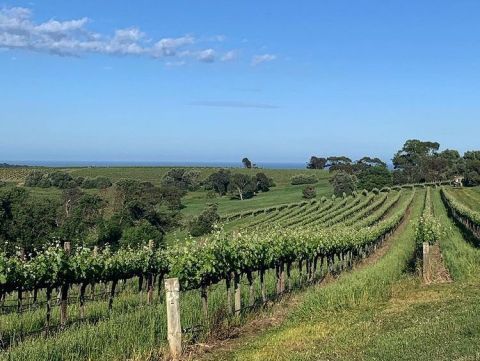From AU$22, £12.25, 169 Swedish kronor, $19.98, €16.88
Anyone who has enjoyed egg and bacon ice cream (thank you Heston Blumenthal, circa 2007) or banana and curry pizza (thank you Leeds University, circa 1997) will know how seemingly dissonant flavours can create unexpected harmony. Enter stage right Côte Rôtie, whose Syrah and (optional) Viognier combo is probably more related to pragmatism than artistry (Viognier provided generous sugar accumulation in a place where Syrah didn't always fully ripen, and there are other benefits of co-fermentation).
As for Syrah and Riesling ... well, why not? Especially when the results are as tasty as Dandelion's 2018 rendering, whose full name is 'Lion's Tooth of McLaren Vale'.
The wine is made by fermenting whole bunches of hand-picked Shiraz on top of Riesling skins for 11 days, before being oak aged for 18 months in mostly old French barriques. The Riesling skins come from the Eden Valley, presumably left-over from the fermentations that produce the two dry Rieslings in the Dandelion range, Wonderland and Enchanted Garden.
But regardless of how it is made, the salient point for wine lovers is whether you can detect the presence of Riesling purely by tasting, and I'm pleased to say that I can give a definitive answer: maybe.
This is the same answer that applies to co-fermented Syrah and Viognier, incidentally, be it from Côte Rôtie or Canberra. Sometimes you can tell, sometimes you can't, and sometimes you're not sure – because wine shouldn't be an equation with a right or wrong answer, it should be a riddle wrapped in a mystery inside an enigma, served in excellent glassware. [Thank you, Richard – JR.]
What you certainly do get is classic McLaren Vale Shiraz giving plenty of eager-to-please bramble fruit on the palate, with typical concentration and richness. While hefty, it seems a little less bold than their single-varietal Lionheart Shiraz from the same vintage, so perhaps that Riesling element provides something of a calming effect. I also wondered if the faint floral aroma was thanks to Riesling too, but couldn't be certain. Either way, the overall effect is eminently drinkable, with soft tannins and well-integrated, juicy acidity.
Dandelion's winemaker is Elena Brooks, originally from Bulgaria, but who arrived at Adelaide University to study winemaking aged 19. Her childhood was spent in close proximity to the large-scale producer Vinprom Lyaskovets, where she learned about wine from a young age, thanks to her mother's job at the winery and the Australian winemakers who visited as consultants. (Thanks to Wine Business Monthly's 2020 profile of Elena in which her husband and partner in Dandelion, the ebullient Zar Brooks, maintains that 'meeting her has been my life’s only proper achievement'.)
Today, she is part of the Australian wine establishment, with a host of awards on her mantlepiece. Her range includes many different varieties under several different brands, including a textbook Touriga and a stunningly good-value Pinot Noir, both under the Heirloom label. Furthermore, she makes wine in Spain under the name Cien y Pico, whose Doble Pasta is a former WoW on these pages – and was the red I served at my wedding in 2012.
All those wines are worth seeking, but the Heirloom has relatively limited distribution in the US and UK, whereas the Lion's Tooth is not only widely available, but exceptionally good value at under £15. US and European retailers seem to still have the 2017 vintage, but British merchants already have the 2018 in stock, and Exel Wines in the UK are already listing the 2019 vintage.
See tasting notes on Dandelion wines back to the 2007 vintage.















